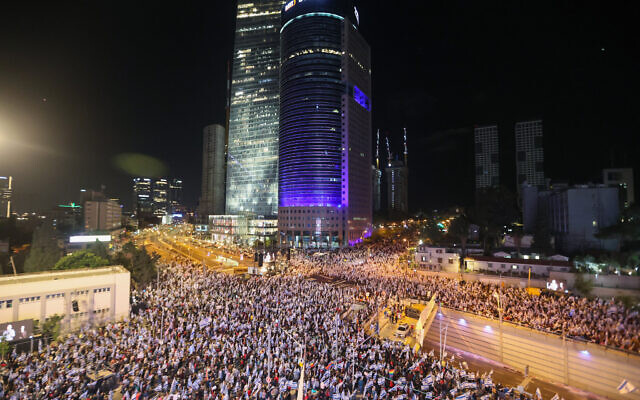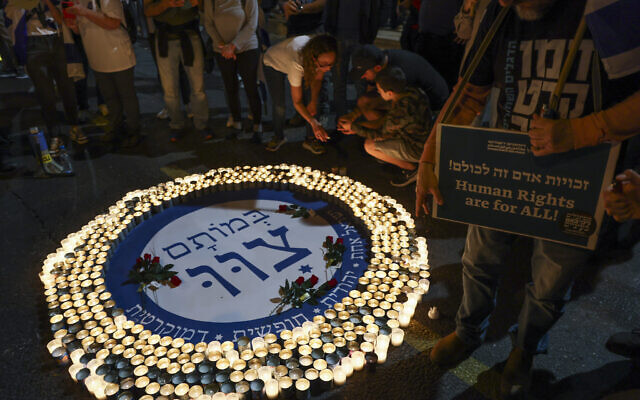Israel's non-democratic laws will have a devastating impact on the Palestinians
Janan Abdu
22 April 2023
The judicial reforms are just one step in implementing the dangerous ideology of the current far-right government that aims to eliminate the Palestinians

A woman protests against the government's controversial judicial reform bill, in Haifa on 9 March 2023 (AFP)
Since taking office last December, the far-right Israeli government led by Prime Minister Benjamin Netanyahu - along with Minister of National Security Itamar Ben-Gvir, Minister of Finance Bazalel Smotrich, and others - has imposed profound changes to Israeli law.
For months, Jewish Israelis have taken to the streets to protest against these judicial reforms, which would severely undermine the Supreme Court's powers and oversight of the legislative and executive branches.
The 37th Israeli government has focused its policy guidelines on the following three areas, which overlap and cannot be separated from each other: sovereignty, national security, and settlement expansion.
These guidelines reveal the objective of the new government: to further entrench Israel as a non-democratic Jewish supremacy inclined towards settler-racist fascism that does not recognise the Palestinian people or their rights.
Authoritarian measures
According to government officials, the new guidelines established by Israel's coalition leaders seek to restore a balance between the legislative, executive, and judicial branches. Israeli Justice Minister Yariv Levin announced in January the judicial reforms and a comprehensive plan to implement them in stages.
These changes can be divided into four categories: 1) A series of laws that remove the judiciary's oversight authority; 2) an amendment to Israeli Basic Law that specifies conditions to invalidate laws and transfers authority to the Israeli parliament (Knesset); 3) the tightening of government control over the selection of judges; 4) an amendment to how the Attorney General, ministers, and other government officials are appointed.
Israel’s long war between the generals and extremists is not going away
Solidifying its control
Israel's Basic Law stipulates that the decision to change or repeal a law must be made unanimously by a judicial body of all the Supreme Court justices.
In turn, the Israeli government is working to change the composition of the judge selection committee and the judges' composition in a way that guarantees its control and that of the ruling coalition - thus politicising the committee.
Another strategy is to revoke the standard of the "reasonableness" of a law. This test enables the Supreme Court to quash an administrative order issued by the government due to its "unreasonableness" and ensures that the ruling party does not promote inequality or harbour "illogical motives", conflicts of interests, or "alien" goals.
So far, the high court has used this standard to overturn "unreasonable" decisions and render them illegal. Israeli Attorney General Gali Baharav-Miara relied on this measure to oppose the decision to appoint the head of the Shas party, Aryeh Deri, as a minister in the 37th Israeli government based on his criminal conviction on corruption charges.
Baharav-Miara recently stopped Ben-Gvir's decision to dismiss the Tel Aviv police chief and transfer him to another job, pending a valid judicial procedure. And the attorney general indicated that her initial investigation raised serious concerns about the legality of the decision.
In response, Ben-Gvir asked coalition leaders to fire her from her job without concern for the legality of his demands.
In practice, revoking the reasonableness test significantly undermines the Supreme Court's ability to intervene in government decisions, and will free the government to do whatever it wishes without any legal oversight.
According to the law proposed by MK Simcha Rotman of the Religious Zionist party, the provision of the "reasonableness" of a law does not apply to "representatives of the public", such as the prime minister, government ministers, council heads, and other elected officials.
The proposed law states: "Despite what was stated in this Basic Law, whoever has the authority to litigate according to the law, including the Supreme Court, is not entitled to discuss or give an order against the government, the prime minister, a minister among its ministers, or another representative of the public concerning the reasonableness of their decisions" (Articles 15 and 15a, the Law of Judiciary).
Proposed governance law
To preempt the disqualification of an appointed minister, a new proposed law would stipulate that: "There is no possibility for legal oversight by any judicial body with regard to the eligibility to appoint or transfer a minister from office, except for specific cases."
The proposed amendment would inform the Supreme Court that it is incompetent and does not have the authority to apply its legal oversight for any reason whatsoever
This change would place all authority in the hands of the prime minister who is then free to appoint cabinet members with the approval of the parliament and without judicial oversight.
Previously, the conditions for eligibility were set by the Knesset but were subject to judicial rulings and standards.
The proposed amendment would therefore inform the judiciary, including the Supreme Court, that it is incompetent and does not have the authority to apply its legal oversight for any reason whatsoever, except for the conditions of capacity "established by law" - meaning physical or mental matters and only two clauses (Section 16.1 (b1)(5)).
This proposed change came in response to the Supreme Court’s intervention in revoking the appointment of minister Aryeh Deri, who had pledged before the court in his previous file that he would not run again for a political position and would stay away from political life - which he violated when he ran again - and was even appointed by Netanyahu as a minister in the current government.
Another amendment states that: "The declaration of the Prime Minister's incapacity shall be made by informing the Knesset of that by himself or by the government, through a decision by three out of four of its members, and only both of them [the Prime Minister and his government] are authorised to do so" (Article 16.1 (b1)(1)).
It adds: "Courts, including the Supreme Court, are not authorized to discuss or approve a request to disqualify or endorse, and any such decision or order issued by the court is null and void." (Section 16.1 (b1)(4))
This amendment aims to prevent the possibility of dismissing a prime minister in cases of suspected criminal offences, as happens to be the case with Netanyahu, who is being tried on charges of corruption and breach of trust.
No authority
The current law affirms that the power to repeal a law, question its validity, or postpone it for a temporary period rests with the Supreme Court, provided that the following conditions are met: the court convenes with the full composition of its judges and a decision is made by a majority of four out of five of the judges.
The proposed change states that even if all the conditions that allow for judicial oversight are met, the Supreme Court would not have the authority to decide on the validity of a law if the Knesset clearly decided that it is valid, despite what was stated in the Basic Law.

Janan Abdu is a lawyer and human rights activist based in Haifa. She is active in raising awareness about and mobilizing international support for Palestinian political prisoners. Her articles have appeared in the Journal of Palestine Studies; the quarterly of the Women’s Studies Center at Birzeit University; al-Ra’ida (AUB); The Other Front (Alternative Information Center); Jadal (Mada al-Carmel). Her publications include Palestinian Women and Feminist Organizations in 1948 Areas (Mada al-Carmel, 2008).
Janan Abdu
22 April 2023
The judicial reforms are just one step in implementing the dangerous ideology of the current far-right government that aims to eliminate the Palestinians

A woman protests against the government's controversial judicial reform bill, in Haifa on 9 March 2023 (AFP)
Since taking office last December, the far-right Israeli government led by Prime Minister Benjamin Netanyahu - along with Minister of National Security Itamar Ben-Gvir, Minister of Finance Bazalel Smotrich, and others - has imposed profound changes to Israeli law.
For months, Jewish Israelis have taken to the streets to protest against these judicial reforms, which would severely undermine the Supreme Court's powers and oversight of the legislative and executive branches.
The 37th Israeli government has focused its policy guidelines on the following three areas, which overlap and cannot be separated from each other: sovereignty, national security, and settlement expansion.
These guidelines reveal the objective of the new government: to further entrench Israel as a non-democratic Jewish supremacy inclined towards settler-racist fascism that does not recognise the Palestinian people or their rights.
Authoritarian measures
According to government officials, the new guidelines established by Israel's coalition leaders seek to restore a balance between the legislative, executive, and judicial branches. Israeli Justice Minister Yariv Levin announced in January the judicial reforms and a comprehensive plan to implement them in stages.
These changes can be divided into four categories: 1) A series of laws that remove the judiciary's oversight authority; 2) an amendment to Israeli Basic Law that specifies conditions to invalidate laws and transfers authority to the Israeli parliament (Knesset); 3) the tightening of government control over the selection of judges; 4) an amendment to how the Attorney General, ministers, and other government officials are appointed.
Israel’s long war between the generals and extremists is not going away
Jonathan Cook
Read More »
One of the proposed reforms is to limit the authority of the Supreme Court in order to prevent it from annulling laws passed by the Knesset deemed unconstitutional and in violation of Israel's Basic Laws.
The change would allow parliament members to circumvent the high court's decisions and reinstate laws that were previously overturned. Although this is a very extreme step, the ruling coalition is working to pass this proposed law with a simple majority of 61 Knesset members.
If passed, the proposed law would allow Israeli parliament members to add an "override clause" to each future bill, shielding it from any subsequent judicial oversight or criticism.
This would last throughout the Knesset term and for a period of no less than two years from the day the law was passed. And, if the future Knesset wants to extend the validity of the overriding law, it can do so once again based on a majority vote.
Another proposed amendment states that no decision can be made to change, repeal, or limit the validity of any law passed through the parliament's override clause.
One of the proposed reforms is to limit the authority of the Supreme Court in order to prevent it from annulling laws passed by the Knesset deemed unconstitutional and in violation of Israel's Basic Laws.
The change would allow parliament members to circumvent the high court's decisions and reinstate laws that were previously overturned. Although this is a very extreme step, the ruling coalition is working to pass this proposed law with a simple majority of 61 Knesset members.
If passed, the proposed law would allow Israeli parliament members to add an "override clause" to each future bill, shielding it from any subsequent judicial oversight or criticism.
This would last throughout the Knesset term and for a period of no less than two years from the day the law was passed. And, if the future Knesset wants to extend the validity of the overriding law, it can do so once again based on a majority vote.
Another proposed amendment states that no decision can be made to change, repeal, or limit the validity of any law passed through the parliament's override clause.
Solidifying its control
Israel's Basic Law stipulates that the decision to change or repeal a law must be made unanimously by a judicial body of all the Supreme Court justices.
In turn, the Israeli government is working to change the composition of the judge selection committee and the judges' composition in a way that guarantees its control and that of the ruling coalition - thus politicising the committee.
Another strategy is to revoke the standard of the "reasonableness" of a law. This test enables the Supreme Court to quash an administrative order issued by the government due to its "unreasonableness" and ensures that the ruling party does not promote inequality or harbour "illogical motives", conflicts of interests, or "alien" goals.
So far, the high court has used this standard to overturn "unreasonable" decisions and render them illegal. Israeli Attorney General Gali Baharav-Miara relied on this measure to oppose the decision to appoint the head of the Shas party, Aryeh Deri, as a minister in the 37th Israeli government based on his criminal conviction on corruption charges.
Baharav-Miara recently stopped Ben-Gvir's decision to dismiss the Tel Aviv police chief and transfer him to another job, pending a valid judicial procedure. And the attorney general indicated that her initial investigation raised serious concerns about the legality of the decision.
In response, Ben-Gvir asked coalition leaders to fire her from her job without concern for the legality of his demands.
In practice, revoking the reasonableness test significantly undermines the Supreme Court's ability to intervene in government decisions, and will free the government to do whatever it wishes without any legal oversight.
According to the law proposed by MK Simcha Rotman of the Religious Zionist party, the provision of the "reasonableness" of a law does not apply to "representatives of the public", such as the prime minister, government ministers, council heads, and other elected officials.
The proposed law states: "Despite what was stated in this Basic Law, whoever has the authority to litigate according to the law, including the Supreme Court, is not entitled to discuss or give an order against the government, the prime minister, a minister among its ministers, or another representative of the public concerning the reasonableness of their decisions" (Articles 15 and 15a, the Law of Judiciary).
Proposed governance law
To preempt the disqualification of an appointed minister, a new proposed law would stipulate that: "There is no possibility for legal oversight by any judicial body with regard to the eligibility to appoint or transfer a minister from office, except for specific cases."
The proposed amendment would inform the Supreme Court that it is incompetent and does not have the authority to apply its legal oversight for any reason whatsoever
This change would place all authority in the hands of the prime minister who is then free to appoint cabinet members with the approval of the parliament and without judicial oversight.
Previously, the conditions for eligibility were set by the Knesset but were subject to judicial rulings and standards.
The proposed amendment would therefore inform the judiciary, including the Supreme Court, that it is incompetent and does not have the authority to apply its legal oversight for any reason whatsoever, except for the conditions of capacity "established by law" - meaning physical or mental matters and only two clauses (Section 16.1 (b1)(5)).
This proposed change came in response to the Supreme Court’s intervention in revoking the appointment of minister Aryeh Deri, who had pledged before the court in his previous file that he would not run again for a political position and would stay away from political life - which he violated when he ran again - and was even appointed by Netanyahu as a minister in the current government.
Another amendment states that: "The declaration of the Prime Minister's incapacity shall be made by informing the Knesset of that by himself or by the government, through a decision by three out of four of its members, and only both of them [the Prime Minister and his government] are authorised to do so" (Article 16.1 (b1)(1)).
It adds: "Courts, including the Supreme Court, are not authorized to discuss or approve a request to disqualify or endorse, and any such decision or order issued by the court is null and void." (Section 16.1 (b1)(4))
This amendment aims to prevent the possibility of dismissing a prime minister in cases of suspected criminal offences, as happens to be the case with Netanyahu, who is being tried on charges of corruption and breach of trust.
No authority
The current law affirms that the power to repeal a law, question its validity, or postpone it for a temporary period rests with the Supreme Court, provided that the following conditions are met: the court convenes with the full composition of its judges and a decision is made by a majority of four out of five of the judges.
The proposed change states that even if all the conditions that allow for judicial oversight are met, the Supreme Court would not have the authority to decide on the validity of a law if the Knesset clearly decided that it is valid, despite what was stated in the Basic Law.
Read More »
This law restricts the Supreme Court and effectively eliminates its authority to abolish any law, no matter how racist, dictatorial, or unreasonable it is.
Another amendment involves the appointment of judges.
According to the new proposal, the number of the Judicial Selection Committee members would be increased from nine to 11 and divided into two committees: one for the selection of Supreme Court justices and the other for selecting judges in the other courts.
The committee for the selection of Supreme Court justices would consist of three ministers, three Knesset members from the ruling coalition, two Knesset members from the opposition, and three Supreme Court justices, including the chief justice. That translates to a majority of 6 members of the ruling coalition.
In addition, the government's plan calls for abolishing the rule of appointing the most senior Supreme Court justice as chief of the court, so that the chief justice is to be appointed by an ordinary majority in the committee whose majority members are from the ruling coalition. This means complete government control over the Supreme Court.
The rules involving the appointment of the Attorney General and judicial counsels to the Knesset and various ministries will also change if these reforms are passed.
Ultimately, the amendment seeks to politicise the Attorney General's position and the Justice Ministry, while simultaneously weakening the status of legal counsels in government ministries so that their professional opinions become nonbinding recommendations as they are appointed politically by the minister directly.
Legalised fascism
These legal reforms, which aim to undermine the Israeli judiciary, have greatly concerned many ordinary Israelis. Israeli President Isaac Herzog presented a new settlement proposal regarding the judicial crisis. However, his offer was rejected by the ruling coalition.
The ruling coalition has a majority that will enable all of these non-democratic laws to pass
Prime Minister Benjamin Netanyahu stated that the main provisions contained in Herzog's plan would maintain the status quo and would not achieve the needed "balance" between the three government branches. The heads of the ruling coalition issued a unified position stating that this plan is biased in favour of reform opponents.
A reading of these laws, proposals, and amendments, which have been presented since the beginning of this government's rule, shows that the outcome is a fascist dictatorial regime in which there is no separation of powers as the government and the Knesset work without oversight or accountability.
The ruling coalition has a majority that will enable all of these non-democratic laws to pass. These changes will not only affect Israelis but will also, of course, have a devastating impact on occupied Palestine and those living as second-class citizens in Israel.
The army, police - including oversight of the police - and the courts are all in the hands of the right-wing government. In just a few months since taking office, Smotrich has called for "wiping out" the Palestinian town, Huwwara, from existence and declared that there is no such thing as a Palestinian people.

Ben-Gvir has expanded his own powers and pushed through amendments to the police decree demanding that Mahash, Israel's police investigation unit (for violations and criminal offences), be transferred to his authority and no longer under the Public Prosecution in the Justice Department.
The judicial reforms are just one step in implementing the dangerous ideology of the current far-right government which aims to eliminate the Palestinians.
The views expressed in this article belong to the author and do not necessarily reflect the editorial policy of Middle East Eye.
This law restricts the Supreme Court and effectively eliminates its authority to abolish any law, no matter how racist, dictatorial, or unreasonable it is.
Another amendment involves the appointment of judges.
According to the new proposal, the number of the Judicial Selection Committee members would be increased from nine to 11 and divided into two committees: one for the selection of Supreme Court justices and the other for selecting judges in the other courts.
The committee for the selection of Supreme Court justices would consist of three ministers, three Knesset members from the ruling coalition, two Knesset members from the opposition, and three Supreme Court justices, including the chief justice. That translates to a majority of 6 members of the ruling coalition.
In addition, the government's plan calls for abolishing the rule of appointing the most senior Supreme Court justice as chief of the court, so that the chief justice is to be appointed by an ordinary majority in the committee whose majority members are from the ruling coalition. This means complete government control over the Supreme Court.
The rules involving the appointment of the Attorney General and judicial counsels to the Knesset and various ministries will also change if these reforms are passed.
Ultimately, the amendment seeks to politicise the Attorney General's position and the Justice Ministry, while simultaneously weakening the status of legal counsels in government ministries so that their professional opinions become nonbinding recommendations as they are appointed politically by the minister directly.
Legalised fascism
These legal reforms, which aim to undermine the Israeli judiciary, have greatly concerned many ordinary Israelis. Israeli President Isaac Herzog presented a new settlement proposal regarding the judicial crisis. However, his offer was rejected by the ruling coalition.
The ruling coalition has a majority that will enable all of these non-democratic laws to pass
Prime Minister Benjamin Netanyahu stated that the main provisions contained in Herzog's plan would maintain the status quo and would not achieve the needed "balance" between the three government branches. The heads of the ruling coalition issued a unified position stating that this plan is biased in favour of reform opponents.
A reading of these laws, proposals, and amendments, which have been presented since the beginning of this government's rule, shows that the outcome is a fascist dictatorial regime in which there is no separation of powers as the government and the Knesset work without oversight or accountability.
The ruling coalition has a majority that will enable all of these non-democratic laws to pass. These changes will not only affect Israelis but will also, of course, have a devastating impact on occupied Palestine and those living as second-class citizens in Israel.
The army, police - including oversight of the police - and the courts are all in the hands of the right-wing government. In just a few months since taking office, Smotrich has called for "wiping out" the Palestinian town, Huwwara, from existence and declared that there is no such thing as a Palestinian people.

Ben-Gvir has expanded his own powers and pushed through amendments to the police decree demanding that Mahash, Israel's police investigation unit (for violations and criminal offences), be transferred to his authority and no longer under the Public Prosecution in the Justice Department.
The judicial reforms are just one step in implementing the dangerous ideology of the current far-right government which aims to eliminate the Palestinians.
The views expressed in this article belong to the author and do not necessarily reflect the editorial policy of Middle East Eye.

Janan Abdu is a lawyer and human rights activist based in Haifa. She is active in raising awareness about and mobilizing international support for Palestinian political prisoners. Her articles have appeared in the Journal of Palestine Studies; the quarterly of the Women’s Studies Center at Birzeit University; al-Ra’ida (AUB); The Other Front (Alternative Information Center); Jadal (Mada al-Carmel). Her publications include Palestinian Women and Feminist Organizations in 1948 Areas (Mada al-Carmel, 2008).
16th set of weekly rallies held nationwide, with over 110,000 estimated to attend main demo in Tel Aviv; Lapid: Without street protests, ‘the disaster would have already occurred’
By TOI STAFF
22 April 2023,

Bereaved families and other Israelis stand next to memorial candles during a protest against the Israeli government's planned judicial overhaul, in Tel Aviv on April 22, 2023. (Erik Marmor/Flash90)
Tens of thousands of protesters rallied Saturday evening as part of ongoing demonstrations against the government’s contentious judicial overhaul, with tensions elevated ahead of Memorial Day and Israel’s 75th Independence Day next week.
At the main protest in Tel Aviv, members of bereaved families set up a makeshift memorial with candles to commemorate fallen soldiers.
The families urged politicians to stay clear of cemeteries on Memorial Day, which begins Monday at nightfall and ends Tuesday evening with the start of Independence Day.
Activists unfurled a large banner commemorating troops that read: “We’ll defend what you’ve fallen for.”
Sheila Katz, CEO of the National Council of Jewish Women, spoke at the Tel Aviv rally, addressing her remarks in English to American Jews.
“This is our fight, too!” she said. “If you love Israel, if you call yourself a Zionist: Get off the couch and into the streets. Speak up. We cannot let Israel’s democracy be dismantled on our watch!”

Demonstrators lift flags and placards during a rally to protest the Israeli government’s judicial overhaul plans, in Tel Aviv, on April 22, 2023. (JACK GUEZ / AFP)
“There are hundreds of thousands of you out here tonight. But know there are millions more standing with you in America and around the world. We see you out here every week fighting for this country we love,” Katz added.
“You, the people of Israel, are our ‘or la’goyim’ [light unto the nations], showing the world what it means to fight for freedom. We are in this together. And with one voice we say: De-mo-kra-tia! [democracy],” she added.

Protesters unfurl a banner that reads: ‘We’ll defend what you’ve fallen for,’ in preparation for Memorial Day next week, in Tel Aviv, April 22, 2023. (Or Adar/Courtesy)
Hebrew media outlets estimated turnout of at least 110,000 in Tel Aviv, while protest organizers said 165,000 people demonstrated there. The figures could not be independently verified.
Police said around 20 of the protesters entered Tel Aviv’s Ayalon Highway, near the Hashalom Junction, but were quickly dispersed by officers.
In another incident on Yitzhak Sadeh, several protesters attempted to enter the Ayalon Highway, but were blocked by officers, according to police, who said traffic was flowing on the highway.
Demonstrations were also held in other cities and locations across Israel, including Haifa (where an estimated 20,000 protested), Jerusalem (where 15,000 were said to gather) and Hod Hasharon, where opposition leader Yair Lapid addressed the crowd.
“If you didn’t go out to the streets, the disaster would have already occurred,” he said. “What’s happened here in recent months is breathtaking.”
הנסיך הקטן מפלוגה ב'
מ"אחים לנשק" נמסר: "נזכור ולא נשכח את טובי בניה ובנותיה של המדינה אשר נפלו למען נצח ישראל ולמען הגנה על ישראל – יהודית ודמוקרטית
דגל קפלן של *אחים לנשק* מוקדש למשפחת השכול"
קרדיט: אביב אטלס pic.twitter.com/ETYmyfL044
— ???????? ???????????????????????? (@iloveisraell) April 22, 2023
In Jerusalem, thousands marched to Paris Square, near the prime minister’s official residence, from their usual Saturday night gathering point outside the President’s Residence.
Among the speakers, former Likud minister Limor Livnat said the coalition was attempting to impose regime change and to “castrate the High Court.”
She quoted former Likud prime minister Menachem Begin championing the independence of the courts and their ultimate authority to protect individual rights.
Dr. Tali Sela, whose brother was killed fighting in Lebanon in 1993, accused the government of breaching its contract with Israel soldiers. “My brother gave his life on the basis of that contract – that Israel is a democracy… The government is trampling democracy.”
“For the sake of those who gave their lives for this country, I cannot be silent,” she said.

A sign at the Jerusalem anti-overhaul protest shows Prime Minister Benjamin Netanyahu and Finance Minister Bezalel Smotrich as cartoon characters Beavis and Butt-Head, April 22, 2023. (DH/Times of Israel)
Elsewhere, some 2,000 protesters gathered at the Karkuk Junction in northern Israel, where weekly demonstrations have been held. Some 300 protesters marched from Karkuk to the nearby junction, according to the Ynet news site.
Protesters have been gathering for nearly four months against the hardline coalition’s plans to overhaul the judicial system, bring most judicial appointments under government control, and curb the oversight powers of the High Court of Justice.

Demonstrators lift flags and placards during a rally to protest the Israeli government’s judicial overhaul bill in Tel Aviv, on April 22, 2023. (Jack Guez/AFP)
Saturday’s demonstrations, held for the 16th weekend in a row, came ahead of a week that will see large rallies from both opponents and proponents of the overhaul, as the nation is set to honor its fallen on Memorial Day and mark 75 years since its founding on Independence Day.
Amid concerns of disruption during Memorial Day, leading opposition lawmakers Lapid and Benny Gantz made a rare call for unity with Prime Minister Benjamin Netanyahu and Defense Minister Yoav Gallant, urging Israelis to put aside deep divisions for a single day in honor of those killed. A similar joint call was issued by Modiin Mayor Haim Bibas, who also chairs the Federation of Local Authorities, along with Jerusalem Mayor Moshe Lion, Tel Aviv Mayor Ron Huldai and more than 115 other municipality heads across the country.
On Tuesday evening, the central torch-lighting ceremony will be held as the country moves from mourning those killed in military service and terror attacks to celebrating 75 years of independence.
The usually apolitical ceremony has taken on a different tone this year amid the government’s plans to shackle the judiciary. Lapid has announced he would not attend the ceremony due to societal divisions he said the government has created due to its radical judicial overhaul program.
Lapid’s decision followed reports that Transportation Minister Miri Regev, who is responsible for the ceremony, plans to cut the live broadcast of the event and switch to a rehearsal recording should the actual torch-lighting ceremony be interrupted by anti-government protestors.
At the same time as the ceremony, a mass rally — billed as the largest in Israel’s history — will be held at Tel Aviv’s Kaplan Street at 8:30 p.m. on Tuesday evening.
Meanwhile, supporters of the overhaul are set to rally on Thursday evening.
Justice Minister Yariv Levin called on supporters to attend a large demonstration in Jerusalem on Thursday “to stand between the Knesset building and the Supreme Court building and say with unprecedented force: the people demand legal reform. The mandate received by the right-wing government must be realized.”

Demonstrators rally against the government’s judicial overhaul plans, in Tel Aviv, on April 22, 2023. (JACK GUEZ / AFP)
The Knesset is scheduled to return from its month-long recess on April 30, with a law to put judicial appointments within political control, one part of the legislative package, ready to be passed within days.
Critics say the overhaul, which will shift much of the judiciary’s power into the government’s hands, will make Israel a democracy in name only, shielding leaders from accountability while leaving minority rights largely unprotected and subject to the whims of Netanyahu’s hard-right government. Proponents say the changes are needed to rein in what they see as an overly activist court.
Demonstrators lift flags and placards during a rally to protest the Israeli government's judicial overhaul plans, in Tel Aviv, on April 22, 2023. (JACK GUEZ / AFP)

Bereaved families and Israelis stand next to memorial candles during a protest against the Israeli government's planned judicial overhaul in Tel Aviv on April 22, 2023. (Erik Marmor/Flash90)

Demonstrators wave flags during a rally to protest the Israeli government's judicial overhaul plans, in Tel Aviv, on April 22, 2023. (JACK GUEZ / AFP)

Demonstrators light memorial candles during a rally to protest the government's judicial overhaul plans, in Tel Aviv, on April 22, 2023, three days before Israel's annual memorial day for fallen soldiers. The text reads: "In their deaths, their commanded us: One Israel. Jewish. Free. Democratic" (Photo by JACK GUEZ / AFP)

Demonstrators lift a banner during a rally to protest the Israeli government's judicial overhaul bill in Tel Aviv, on April 22, 2023. (Jack Guez/AFP)

Thousands of Israelis protest against the planned judicial overhaul, in Tel Aviv, on April 22, 2023. "The rotten one," reads the banner with Prime Minister Benjamin Netanyahu's picture. (Avshalom Sassoni/Flash90)1

No comments:
Post a Comment